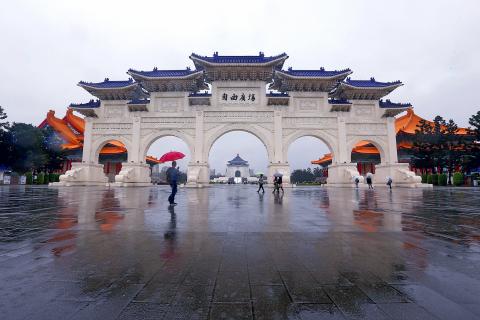President Tsai Ing-wen (蔡英文) yesterday announced the declassification of all historical records relating to the 228 Incident, saying that the measure is critical to establishing the truth and expediting transitional justice.
“Pushing for transitional justice is one of the most important missions for Taiwan’s democracy, but we often have to discern the truth from the mists, with the most crucial yet complicated task being uncovering and collecting the relevant documents, which are scattered across various government agencies,” Tsai said on Facebook.
Tsai’s Facebook post came after the government released a press release touting similar moves, in which it said the speedy declassification of confidential files was aimed at meeting the public’s expectation of transitional justice.

Photo: CNA
Tsai said collecting such material is also fundamental to the government’s efforts to compile a report on transitional justice, “as many traces of history can be found in past government documents, which reveal the names of the people involved, related incidents or other key elements.”
Of the National Achieves Administration’s documents relating to the 228 Incident — which total 1.37 million pages — 4,617 documents were classified, but they have all now been declassified in their entirety, Tsai said.
“In addition, the related political files containing a total of 990,000 pages from 83 different government divisions were listed as pending transfer [to the administration]. The transfer process is expected to be completed by the end of June,” Tsai said.
The Cabinet plans to allocate additional funds to the National Archives Administration to facilitate a three-year-long investigation and collection of political materials relating to the 228 Incident and the Period of National Mobilization for Suppression of the Communist Rebellion, which is to begin on March 1, Tsai said.
“That will provide the foundation for the writing of our investigative report on transitional justice,” she said.
The 228 Incident refers to a crackdown launched by the then-Chinese Nationalist Party (KMT) regime against civilian demonstrations following an incident in Taipei on Feb. 27, 1947. The event marked the beginning of the White Terror era, during which thousands of Taiwanese were arrested, imprisoned and executed. Historians estimate as many as 30,000 people were killed.
Presidential Office spokesman Alex Huang (黃重諺) said the latest development, goals and purposes of the government’s transitional justice commitment are expected to be the focal points of Tsai’s first speech on the 228 Incident as president.
“Pushing for transitional justice is a necessary process for any democratic nation undergoing a transition from authoritarian rule… It is the government’s responsibility to deal with illegitimate party assets, uncover the truth about human rights violations and problematic policies enacted during the rule of the authoritarian regime, and to restore people’s rights,” Huang said.
The transitional justice bill and the political archives bill have been listed as the Democratic Progressive Party caucus’ priorites in the current legislative session, Huang said.
After the passage of the bills into law, an investigative report on the White Terror era is to be published and a truth and reconciliation commission established, Huang said.

Tropical Storm Gaemi strengthened into a typhoon at 2pm yesterday, and could make landfall in Yilan County tomorrow, the Central Weather Administration (CWA) said yesterday. The agency was scheduled to issue a sea warning at 11:30pm yesterday, and could issue a land warning later today. Gaemi was moving north-northwest at 4kph, carrying maximum sustained winds near its center of up to 118.8kph and gusts of 154.8kph. The circumference is forecast to reach eastern Taiwan tomorrow morning, with the center making landfall in Yilan County later that night before departing from the north coast, CWA weather forecaster Kuan Shin-ping (官欣平) said yesterday. Uncertainty remains and

SEA WARNING LIKELY: The storm, named Gaemi, could become a moderate typhoon on Wednesday or Thursday, with the Taipei City Government preparing for flooding A tropical depression east of the Philippines developed into a tropical storm named Gaemi at 2pm yesterday, and was moving toward eastern Taiwan, the Central Weather Administration (CWA) said. Gaemi could begin to affect Taiwan proper on Tuesday, lasting until Friday, and could develop into a moderate typhoon on Wednesday or Thursday, it said. A sea warning for Gaemi could be issued as early as Tuesday morning, it added. Gaemi, the third tropical storm in the Pacific Ocean this typhoon season, is projected to begin moving northwest today, and be closest to Taiwan on Wednesday or Thursday, the agency said. Today, there would likely

DISRUPTIONS: The high-speed rail is to operate as normal, while several airlines either canceled flights or announced early departures or late arrivals Schools and offices in 15 cities and counties are to be closed today due to Typhoon Gaemi, local governments announced last night. The 15 are: Taipei, New Taipei City, Taoyuan, Tainan, Keelung, Hsinchu and Kaohsiung, as well as Yilan, Hualien, Hsinchu, Miaoli, Chiayi, Pingtung, Penghu and Lienchiang counties. People should brace for torrential rainfall brought by the storm, with its center forecast to make landfall on the east coast between tonight and tomorrow morning, the Central Weather Administration (CWA) said. The agency issued a sea warning for the typhoon at 11:30pm on Monday, followed by a land warning at 11:30am yesterday. As of

CASUALTY: A 70-year-old woman was killed by a falling tree in Kaohsiung as the premier warned all government agencies to remain on high alert for the next 24 hours Schools and offices nationwide are to be closed for a second day today as Typhoon Gaemi crosses over the nation, bringing torrential rain and whipping winds. Gaemi was forecast to make landfall late last night. From Tuesday night, its outer band brought substantial rainfall and strong winds to the nation. As of 6:15pm last night, the typhoon’s center was 20km southeast of Hualien County, Central Weather Administration (CWA) data showed. It was moving at 19kph and had a radius of 250km. As of 3pm yesterday, one woman had died, while 58 people were injured, the Central Emergency Operation Center said. The 70-year-old